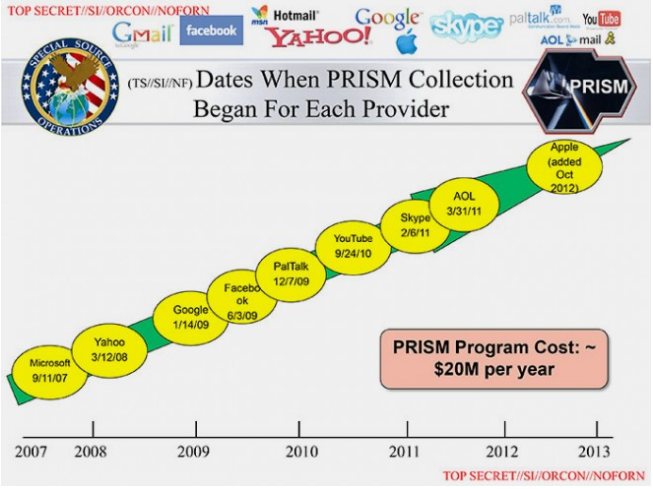
When I read government arguments in defense of the NSA, an oft-repeated line was:
We’re not targeting Americans. We’re targeting foreigners.
Foreigners.
I really dislike that word.
And I’m sure companies like Apple, Google and Facebook do as well.
Why?
Because 80% of Google’s customers are foreigners.
More than 50% of Microsoft’s revenue come from foreigners.
Most of Facebook’s users are foreigners.
Apple gets more than 12% of its revenues from China.
And now these foreigners are well aware that their emails and texts and Facebook posts may have been scanned by the US intelligence industry.
I was asked by a tech company recently about what factors could disrupt their current globalization plans in the years ahead.
The NSA was at the top of my list.
We now see a rush of new and established tech companies around the world to create services that are located entirely out of reach of the US government (no matter how impractical this may appear). According to this WSJ article (reg required):
Three of Germany’s largest email providers, including partly state-owned Deutsche Telekom AG teamed up to offer a new service, Email Made in Germany. The companies promise that by encrypting email through German servers and hewing to the country’s strict privacy laws, U.S. authorities won’t easily be able to pry inside. More than a hundred thousand Germans have flocked to the service since it was rolled out in August.
So what does the COO of Facebook have to say about this?
“We should all be nervous when countries impose costly new requirements on companies as a condition of serving their citizens,” says Facebook Chief Operating Officer Sheryl Sandberg. “It means fragmenting the Internet and putting the economic and social opportunities it creates at risk.”
The companies that are most nervous are the large established players, like, um, Facebook.
For start-ups around the world, this news is actually good news. From the same article:
For small German companies competing against big ones—like online-security company Symantec Corp. and Amazon.com Inc. which provides corporate cloud services—the NSA surveillance program “is a present from heaven,” says Oliver Dehning, chief executive of antispameuropeGmbH, which builds spam-protection software. “It’s kind of an opportunity to strike back and protect our home market.”
The fact is, the Balkanization of the Internet is not a new trend, but the NSA (no thanks to Snowden) accelerated it.
Do foreigners care about their email being scanned?
If the Germans are a leading indicator, perhaps so.
Though this article would indicate that Europeans largely are not concerned about the goings on of the security agencies. After all, it wasn’t just the US government at work here; there were other governments involved.
But I think the threat to US-based tech companies is real (perception, after all, is reality). I think the impact will be felt years from now, when there are new and competitive service providers taking a distinctly local approach to their offerings. This is where global service providers get uneasy. It’s difficult to compete with a “local by design” business when you are a “global by design.”
The sad part about all of this is that China — the poster child of Internet privacy violators — suddenly doesn’t look all that bad.
UPDATE: US tech leaders visited Washington, again, and warned of the Balkanization of the Internet.

Brazil is already following the same steps of Germany. The Congress are approving new laws to try stopping or cutting down the activities of NSA in Brazil. Also Brazil is leading a group of South American countries to install an Internet independent of USA. In United Nation, Brazil and others countries are already discussing more security in the Internet since the NSA’s activities became public.
Thanks Fred. I also came across this regarding the EU regulating the cloud: http://www.nytimes.com/2013/10/07/business/international/europe-aims-to-regulate-the-cloud.html
Beware of the Brailian Internet. While making hat out of NSA revelations, Brazil has no qualms about spying on its own citizens and has more restrictions on the internet than does the US. To some extent their concerns are a cynical ploy to bring business to Brazil and distract from their own questionable record. Which isn’t to detract from the seriousness of the NSA revelations at all, but merely to point out that governments in general don’t like the internet and its subversive potential and that the US may in some respects be a lesser bad than some others.